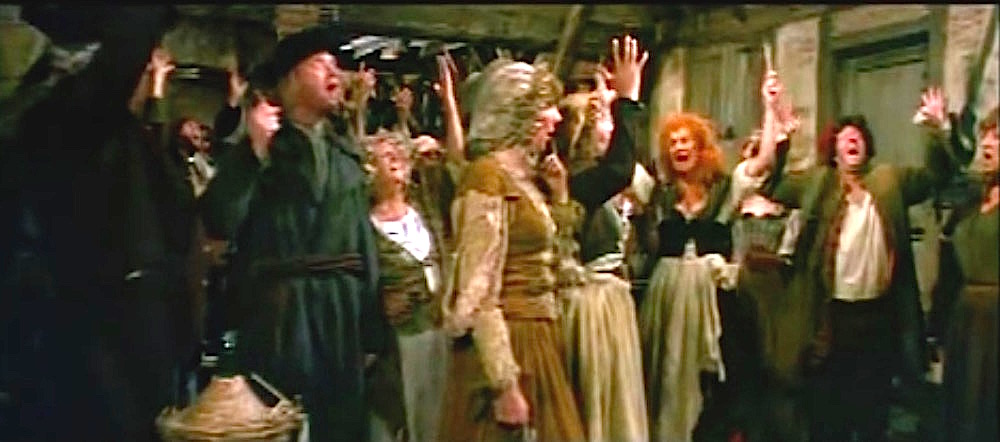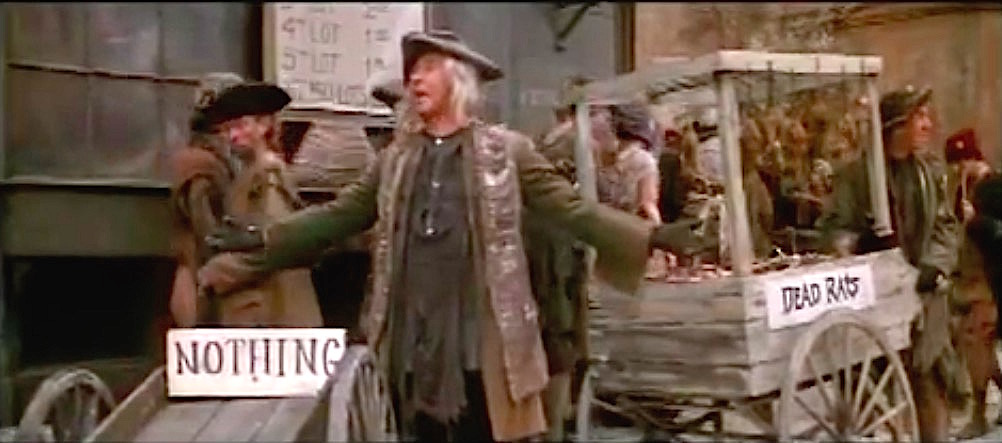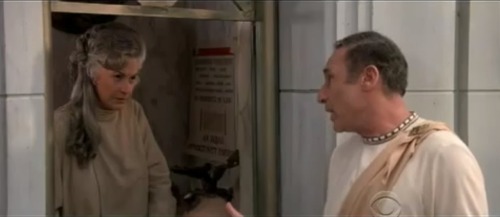Mel Brooks brings his one-of-a-kind comic touch to the history of mankind covering events from the Old Testament to the French Revolution in a series of episodic comedy vignettes. Perhaps the most important comedy element of "History of the World" is that it doesn't have a linear story. It is a series of sketches covering the Stone Age, the Old Testament, the Roman Empire, the Spanish Inquisition and the French Revolution, closing with a mock teaser trailer for the nonexistent sequel.
While "The Meaning of Life" is about philosophy, however, "History of the World" is about history. Brooks casts his comedic eye at humanity's past and, if the sketches are any evidence, seems to view our story as one of big guys keeping little guys down. You see how a small hobby for a single person when coupled with the right artist and director can lead to a global phenomenon that shows no signs of stopping. You know how there are people who buy a gaming console just to play one or two game series like FIFA or Call of Duty?
On the portable side of things, the parallel exists where people buy handheld systems just to play Pokémon games. In general, Brooks' films aren't exactly noted for their political correctness—after all, the director's very first film was about an Adolf Hitler musical. Still, even he wondered if the breakout song in History of the World had finally crossed a line.
"I don't know how audiences are going to react to the Spanish Inquisition sequence," Brooks told Mademoiselle. As he put it, trying to get a laugh out of any scene that involved "Jews on racks" could be "very dangerous." In the end, history repeated itself. After The Producers was released, Jewish leaders contacted Brooks en masse with complaints about the film's brazen Nazi gags. Thanks to that big inquisition number, History of the World, Part 1 garnered a similar reaction. Many people are surprised to learn about Mel's serious contributions to cinema.
His company, Brooksfilms, produced classics such as 1986's The Fly and 1980's The Elephant Man. In 1982, Brooks produced this wonderful valentine to television's golden age. The story centers around a live TV show starring Stan Kaiser and one of his writers, Benjy Stone who's tasked to watch over unpredictable thespian Alan Swann .
The film would've been a fine comedy if the characters were invented out of whole cloth, but knowing the real-life counterparts enriches the experience tenfold. And don't miss the classic scene when a gangster confronts Kaiser, who responds to death threats with open mockery. That mixture of wit and physical comedy is what keeps My Favorite Year's 100% "fresh" rating on Rotten Tomatoes.
The film is the historical spectacular film genre anthology, focuses on Mel Brooks, wwho brings his one-of-a-kind comic touch to the history of mankind covering events. There are loads of familiarly funny gags in the film, which opens today at the Sutton, the Criterion Center and the 34th Street East and other theaters. But the movie is so sour that its humor is often undermined, because so many of the jokes are either mean-spirited or scatological, or both.
Women are either explicitly predatory or stupidly decorative, and homosexuals are made fun of regularly. Flamboyantly bad taste, which Mr. Brooks raised to the level of supreme wit in his ''Springtime for Hitler'' number in ''The Producers,'' is this time just bad. A musical number about the Spanish Inquisition, with Mr. Brooks playing a torturer who merrily abuses Jews, is about as crashingly unfunny as a musical number can be. Human beings and other animals have had cancer throughout recorded history. So it's no surprise that from the dawn of history people have written about cancer.
Some of the earliest evidence of cancer is found among fossilized bone tumors, human mummies in ancient Egypt, and ancient manuscripts. Growths suggestive of the bone cancer called osteosarcoma have been seen in mummies. Bony skull destruction as seen in cancer of the head and neck has been found, too. The fourth generation of games arrived with Nintendo's new handheld system, the DS. This system boasted a dual screen and had a new engine for the Pokémon games.
Diamond and Pearl continued the tradition of adding new Pokémon and tweaking mechanics while retaining the gameplay people knew and loved. The DS also saw the release of HeartGold and SoulSilver, which used the Diamond and Pearl engine for an enhanced version of Gold and Silver from the Game Boy Color. Gold and Silver also let you breed Pokémon and had a real-time day and night system.
It outsold Pokémon Yellow's record sales with 1.4 million copies combined in a week—the fastest selling video games ever at that point. At the same time, Pokémon Stadium (a spin-off for the Nintendo 64 console) was also the best-selling home console game. This cemented Pokémon as a monster of a franchise that would show no signs of slowing down. Pokémon Red and Green were so successful that there were several special re-releases and limited editions.
One of them was Pokémon Blue, only available as a mail-order title in Japan. Yep, those were still a thing back then and CoroCoro Comics, a monthly magazine, plays an important part in Pokémon history. Even today, said magazine had exclusive information about new Pokémon in the latest games set to release this winter. Today, most people see films on television, whether terrestrial, satellite or subscription video on demand services.
Streaming film content on computers, tablets and mobile phones is becoming more common as it proves to be more convenient for modern audiences and lifestyles. As more people paid to see movies, the industry which grew around them was prepared to invest more money in their production, distribution and exhibition, so large studios were established and dedicated cinemas built. The First World War greatly affected the film industry in Europe, and the American industry grew in relative importance. At first, films were very short, sometimes only a few minutes or less. They were shown at fairgrounds, music halls, or anywhere a screen could be set up and a room darkened.
Subjects included local scenes and activities, views of foreign lands, short comedies and newsworthy events. Part of the problem with ''History of the World - Part I'' is that it's tired, so tired that the cheerful outrageousness of Mr. Brooks's earlier films has become waxen. The jokes often recall ''The Producers'' and particularly ''Blazing Saddles,'' but never are they as bold as they were the first time around. The enormous cast includes some of Mr. Brooks's most resourceful comic sidekicks, among them Madeline Kahn, Cloris Leachman and the indefatigable Harvey Korman.
The very funny Mel Brooks takes you on a musical adventure through history and learn what "really" happened. Travel from a crazy spoof of 2001 to the Roman Empire, where Brooks plays a stand-up philosopher in Caesar's Palace, to the French Revolution, where Brooks is King Louis XVI, plus many more. Those are among mine as well, since they contain some of Brooks' most cheerfully vulgar gags. Brooks has never been one to shy away from vulgarity — once famously bragging that his films rise "below vulgarity" — and this perhaps partially explains "Part One"'slukewarm critical reception at the time it was released. First, even when it isn't making a larger point, it is often quite funny.
Brooks' big song-and-dance number about the Spanish Inquisition, for instance, holds up as hysterically tasteless in the tradition of Brooks' "Springtime for Hitler" in "The Producers" even if it doesn't have much depth. Take the wordplay that uses a 12-letter epithet to reference Oedipus, a character from Greek mythology; if you know the classics, you'll get the joke. The same thing goes wrong with Brooks's big production number in this movie, "The Inquisition," featuring a song-and-dance team of medieval monks, and a chorus line of nuns who splash in a pool, Busby Berkeley-style. We're supposed to laugh at the shocking juxtaposition of religious images and Hollywood corn. But Brooks never gives us an additional comic level, one where he's making funny points about the images.
When he dresses up like a monk and then dances like Donald O'Connor, that's only funny for a second. If we knew anything about the monk as a comic character, the scene could build. An uproarious version of history that proves nothing is sacred – not even the Roman Empire, the French Revolution and the Spanish Inquisition. We display the minimum age for which content is developmentally appropriate. "Sometimes, you will get very lucky, and the set will give you ideas for jokes", Brooks said in a 2012 interview with the Directors Guild of America.
One day, he was gazing out at the scenery that had been built for the caveman segments, when the gears in his head started turning. "I immediately thought, 'Well, where do I go from here?'" Brooks recalled. Heading into the shoot, his plan was to "skip the Bible and go to Rome." But eventually, he realized that the Stone Age set might enable him to explore another chapter in world history. With a few minor alterations, Brooks converted his fake caves into a mountaintop, and the Moses bit was born.
I have already seen a drastic increase in game sales for Nintendo platforms after Pokémon Go released on various online retailers and in local import stores. I can't imagine just how big things will get once Pokémon Go is released worldwide and more people start going out of the house to hunt for mythical pocket monsters. Pokémon is here to stay, so you might as well get used to it and take a crack at catching 'em all. The anime follows Ash Ketchum (remember him?) as he works his way up the ranks in Pokémon leagues across different regions. Outside of the anime on TV, there have been 18 movies and a few full-length TV specials.
Speaking of movies, Legendary Pictures just announced a live-action Detective Pikachu movie that will begin production in 2017. Yes, a spin-off Pokémon game only released in Japan is getting a live-action movie. Now that the legacy platforms are out of the way, we come to the current generation of Nintendo handhelds—the Nintendo 3DS and the enhanced New Nintendo 3DS (did they learn to name devices from Apple?). The 3DS introduced stereoscopic 3D without the need for specialized glasses and this led to the first polygonal 3D graphics in a mainline Pokémon game.
Pokémon X and Y are the sixth generation of Pokémon games and they were the first in the franchise to get a simultaneous worldwide release. I don't suppose I need to say this, but X and Y are the best-selling games on the Nintendo 3DS thus far. If you are familiar with gaming today, you are probably sick of the remakes and remastered versions that keep being released.
If you aren't, every generation or so, video game publishers decide to give some of their best-selling games a visual upgrade or make an enhanced release for new customers and fans of said franchises. Nintendo, no stranger to this concept, releases updated or enhanced versions of their popular games multiple times. One of only 15 people to win the EGOT, legendary funnyman Mel Brooks has excelled on the big screen, the stage and television.
Let's take a look back at 12 of his greatest films, ranked worst to best. "Sometimes, you will get very lucky and the set will give you ideas for jokes," Brooks said in a 2012 interview with the Directors Guild of America. One day, he was gazing out at the scenery that had been built for the caveman segments in History of the World when the gears in his head started turning. Heading into the shoot, his plan was to "skip the Bible and go to Rome.'" But eventually, he realized that the Stone Age set might enable him to explore another chapter in world history. With a few minor alterations, Brooks converted his faux caves into a mountaintop, and the Moses bit was born. Twenty-two years after Your Show of Shows ended its run, Brooks expressed his gratitude to Caesar by giving him a major role in 1976's Silent Movie.
Brooks would cast the comic again in History of the World, this time as Chief Caveman, who has a zeal for music . On June 12, 1981—35 years ago today—Mel Brooks's irreverent take on the course of human events opened in theaters. Though critics were thoroughly divided, History of the World, Part 1 grossed a respectable $31.6 million at the box office, and left countless viewers hungry for a sequel. These 11 footnotes should get you ready for a 35th anniversary screening. No, unfortunately the movie is not available to watch online for free. An uproarious version of history that proves nothing is sacred not even the Roman Empire, the French Revolution and the Spanish Inquisition.
Robert Paul and the race to invent cinema Discover the story of Robert Paul, the forgotten pioneer whose innovations earned him the title of 'father of the British film industry'. Of the many films that comprise the Western genre of American cinema, we're pretty sure there's only one that features a Yiddish-speaking Native American chief . In Blazing Saddles we follow the adventures of Bart, a Black sheriff in the all-white town of Rock Ridge. Richard Pryor, who co-wrote the script, was originally cast for the lead role before his drug and alcohol use prompted a switch, propelling Cleavon Little to an unforgettable performance. Mel Brooks' legendary filmography includes not only the funniest films ever made, but a few surprising landmarks in cinema history. The staff of THIRTEEN picks the thirteen best movies directed or produced by Mel.
Mr. Brooks himself is both the movie's steadiest screen presence and its worst behind-the-scenes enemy. There's almost no routine here that couldn't have been made funnier with a few deletions. MEL BROOKS'S ''History of the World - Part I'' shows its stripes right from the opening scene. In this Dawn of Man episode, apelike creatures rise up from the mud, learning to stand erect and reaching nobly toward the heavens. Then they begin bumping, grinding, rutting, gyrating and otherwise slipping back to the slime from whence they came.
Even by prehistoric standards, Mr. Brooks's latest comedy is especially crude. The other major world leaders depicted here, aside from Louis, are the Roman Emperor Nero and the Spanish Grand Inquisitor Torquemada. If there is a running theme in Brooks' view of major historical events (at least from Western history; non-Western history isn't featured after the Stone Age sketches), it is that people with money and power have great lives.
For people without those things — or who belong to marginalized groups in general —life stinks. There also is nothing inherently funny about Jews, Catholics, nuns, blacks, and gays. They can all conceivably provide the makings of comedy, of course, but in "History of the World" Brooks doesn't have the patience to introduce a character and then create a comic situation about him.
He introduces the character and expects us to laugh at the character himself. Instead of developing a comic situation around Orthodox Jews, he simply shows us some, complete with beards and hats, their heads stuck through a stockade, and expects us to laugh. But while we might laugh with Brooks at a comic situation, we have no reason to laugh at people just because of their appearance or religion. Brooks seems to rely on his own spontaneous comic genius in this film, and genius, even when you have it, is not something to be relied upon.
He provides isolated moments that are indeed hilarious, moments that find an inspired image and zing us with it . But as the movie creeps on, we realize that the inspirations are going to be rare, and that Brooks has not bothered to create a framework for the movie or to people it with characters. Mel Brooks's movie "History of the World, Part 1" is a rambling, undisciplined, sometimes embarrassing failure from one of the most gifted comic filmmakers around. Brooks never seems to have a clear idea of the rationale of his movie, so there's no confident narrative impetus to carry it along. His "history" framework doesn't have an approach or point of view; it's basically just a laundry-line for whatever gags he can hang on it.
























